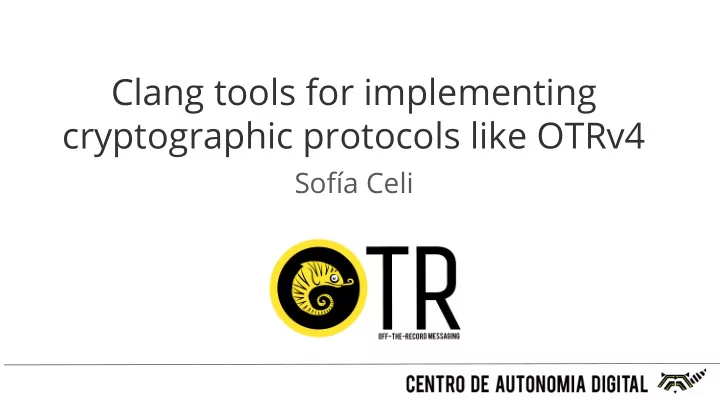

Clang tools for implementing cryptographic protocols like OTRv4 Sofía Celi
What is OTR and why it was created? Cryptographic protocol ● Paper in 2004 by Ian Goldberg , Nikita Borisov and Eric Brewer ● Conversations in the "digital" world should mimic casual real world ● conversations PGP: protect communications. Sign messages and encrypt them. ● Problems: there is a record, there is a ‘proof’ of authorship. ● https://xkcd.com/1553/
Why a version 4 of OTR? We want deniability: participation, message, online and offline ● We want forward secrecy and post-compromise secrecy ● We want a higher security level ● We want to update the cryptographic primitives ● We want additional protection against transcript decryption in the case of ● ECC compromise We want elliptic curves ●
OTRv4 implementation Implementation in C ● Called ‘libotr-ng’: https://github.com/otrv4/libotr-ng ● Usage of C comes with -free- memory issues: ● Buffer overflow ○ Memory leaks ○ Free issues: use after free, double free, invalid free ○ Usage of uninitialized memory or garbage data ○ Overlap of src and dst pointers in memcpy ○ Why it is an issue? ●
“Memory leaks are mismanaged memory allocations. They are caused by heap areas that can no longer be freed, due to a lost pointer and are something every programmer using C has to be careful about. These leaks occur because C doesn’t clean up after itself, unlike Java or C# with its inbuilt garbage collector. Memory leaks are hard to find because a program might work just fine for a while and then crash without apparent reason or simply slow down below acceptable levels. Sometimes this might be misconstrued as a hardware problem.” - C Basics And Concepts Memory Leaks and Debugging with Valgrind (2014), Working group scientific computing Department of informatics Faculty of mathematics, informatics and natural sciences University of Hamburg Leakage of sensitive information: private/secret or message keys ● Memory issues remain dominant (heap out of bounds: read/write. Eg: ● Microsoft: Trends, challenge, and shifts in software vulnerability mitigation (2019) by Matt Miller)
Tips during the project execution Use free after malloc (or similar) ● Not work with the original pointer but rather with a copy of it ● Free what has been malloced in a struct ● Handle return references ● Do not access null pointers: remember to malloc ● Usage of valgrind (it has limitations: crashes, false positives on some OS, ● installation problems. See: https://bugs.kde.org/show_bug.cgi?id=365327)
For cryptography... “any computation, and only computation, leaks information” (Micali and ● Reyzin) Public information vs Secret information ● Heartbleed ●
Problems in some cryptographic code... Little to no testing ● Code, sometimes, does not run nor compile ● Code does not run or compile in certain OS or compilers ● Code is difficult to understand ● Code is not clean ● No usage of tools for checking memory issues or related issues ●
In the OTRv4 library We have a CI which tests in 12 machines (gcc and clang). Locally, we test ● mostly in Linux and MacOS. We test with valgrind (memcheck, helgrind, drd), address sanitizers, ● clang-tidy, splint, ctgrind We check coverage, profiling and style ● We send to check to coverity scan ● In the future: fuzzing, taint analysis ●
Useful tools Address sanitizer: ● Compile time ○ Bugs are easier to find ○ Useful for finding bugs locally in some OS ● Faster than valgrind ● Clearer errors: no repetition, issue is stated in a simple way ● ‘AddressSanitizer: heap-use-after-free on address’ Limitations: runs with the tests only; there is no coverage of other paths ●
Use then: Clang-tidy with the static analyser ● Easier to understand than splint ● Fixes issues in code not tested: free of data unmalloced, unused variables, ● etc. Helps with the style and on the team (onboarding to C) ●
Style is important Important for clean code: clang-format ● Important to eliminate garbage: unused variables or functions, exposed ● functions with no reason, ignored return values.. Usage of one unifying style: clang-format ● Incorporated into the CI ●
Awful issues DH keys were released and later tried to be reused ● People constantly forget to free (clang-tidy: potential memleak) ● Double frees: ‘free too much’ ● Uninitialized values ●
Why is needed? These tools are needed for cryptographic libraries as they catch errors ● that are, sometimes, not seen directly Programmers are not perfect ● Valgrind, sometimes, needs a lot of suppressions to run ●
Ideas
References 1. Serebryany, K., Bruening, D., Potapenko, A., Vyukov, D. AddressSanitizer: A Fast Address Sanity Checker, USENIX. Available at: https://www.usenix.org/system/files/conference/atc12/atc12-final39.pdf 2. Working group scientific computing Department of informatics Faculty of mathematics, informatics and natural sciences. (2014). C Basics And Concepts Memory Leaks and Debugging with Valgrind, NIST ECC workshop. Available at: https://wr.informatik.uni-hamburg.de/_media/teaching/sommersemester _2014/cgk-14-menck-memory-leaks-report.pdf
Thanks! Sofía Celi @cherenkov_d
Recommend
More recommend